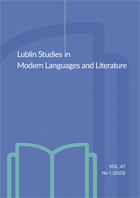Pro-Ukrainian Memes Against 2022 Russian Invasion A Cognitive Linguistics Perspective
Pro-Ukrainian Memes Against 2022 Russian Invasion A Cognitive Linguistics Perspective
Author(s): Aleksandra Majdzińska-Koczorowicz, Julia Ostanina-OlszewskaSubject(s): Cognitive linguistics
Published by: Wydawnictwo Naukowe Uniwersytetu Marii Curie-Sklodowskiej
Keywords: Internet meme; metaphor; metonymy; conceptual blending; Ukraine;
Summary/Abstract: In relation to the 2022 Russian invasion of Ukraine, memes and Internet jokes haveaspecial status. They work as stress-relievers, information vessels, or Russian propa-ganda resistance. The effectiveness of ameme relies on mingling verbal and visualelements in such away that seemingly unrelated scenarios become relatable and canbe interpreted in agiven context. The text aims at discussing the cognitive mechanismsemployed in chosen pro-Ukrainian memes against the 2022 Russian invasion in termsof their bimodal construal. An analysis of agroup of memes was conducted within thecognitive linguistics framework, with reference to the Conceptual Metaphor Theory,conceptual integration theory (Fauconnier & Turner, 2002), and construal (Langacker,2008, 2019). The creation of memes triggers frameshifting and convergence of dif-ferent mental spaces, which results in online meaning construction, where humorousincongruity derives directly from blending and shows how jokes (about tragedies) maybecome humorous, due to frame substitution.
Journal: Lublin Studies in Modern Languages and Literature
- Issue Year: 47/2023
- Issue No: 1
- Page Range: 121-134
- Page Count: 14
- Language: English

